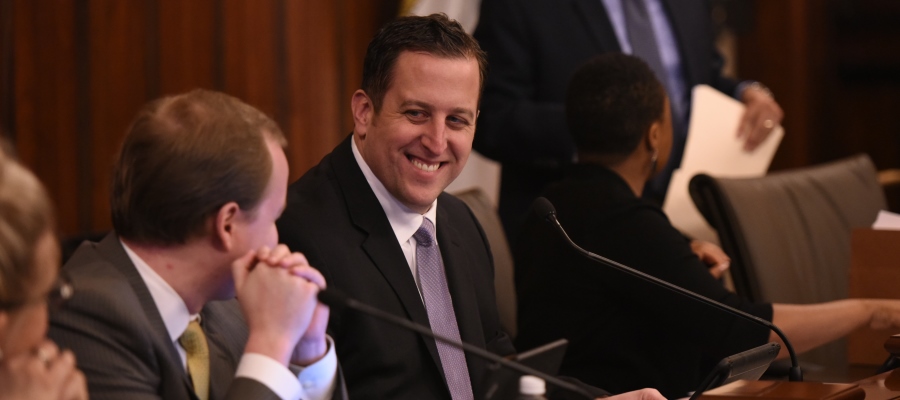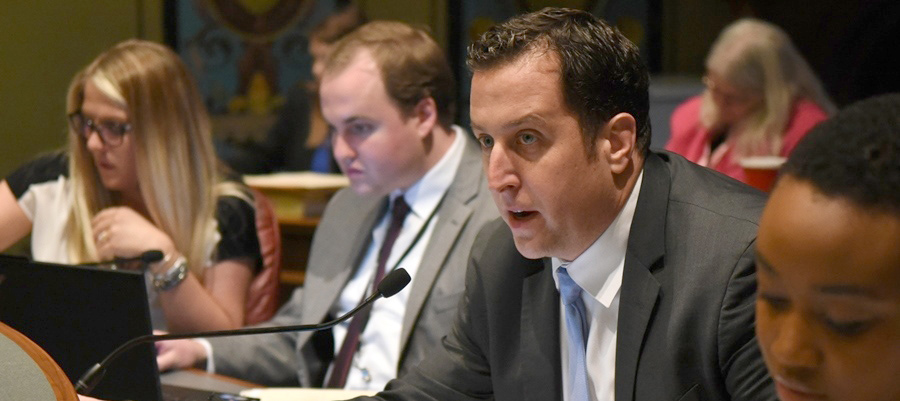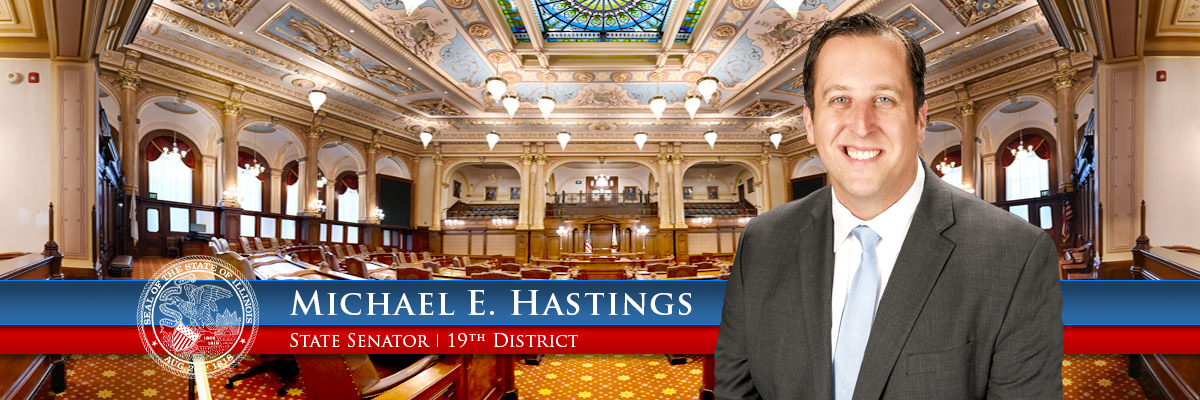- Details
- Category: Press Releases

SPRINGFIELD- State Senator Michael E. Hastings (D-Tinley Park) is outraged at Governor Rauner’s administration for leaking false education funding numbers to one of his many political operations.
Hastings is joining his colleagues in urging the Illinois Executive Inspector General to investigate the misuse of state resources.
“Governor Rauner is bringing Washington politics to Springfield,” Hastings said. “Governor Rauner has compromised his integrity, information and is hindering our children’s ability to succeed. All of Illinois’ children should receive a fair chance to receive a good education regardless of their financial or socioeconomic background.”
The Illinois Senate passed Senate Bill 1, school funding reform, on Wednesday, May 17.
During the Senate debate, Hastings was informed that the governor’s administration did not have finalized accurate funding levels for school districts.
However, on Thursday night, one of the governor’s many political organizations starting contacting school districts throughout Illinois with false numbers to campaign against senators who voted in support of giving students across Illinois the opportunity to succeed.
“This is not the first example of the governor’s misuse of state funds,” Hastings said. “Within the last two months we have unveiled a $2.4 million warehouse leasing deal to benefit his buddies and using state resources for political purposes. What is next?”
Under Senate Bill 1, schools throughout the state would not see a decrease in funding. However, schools that are not at proper funding levels will receive an increase in state dollars to ensure children across Illinois are given the opportunity to receive a good education regardless of the zip code they live in.
“This is a clear violation of state law,” Hastings said. “Entities that receive state dollars cannot use the Illinois taxpayers’ dollars to campaign. We need to find who is responsible for attempting to sabotage negotiations to move our state forward and give our children a better future.”
Illinois Senate Democrats sent a letter to the Illinois Executive Inspector General asking for a formal investigation.
“Governor Rauner, stop screwing around,” Hastings said. “The children of Illinois need you to stop campaigning and do your job. They cannot afford to wait.”
- Details
- Category: Press Releases

SPRINGFIELD— State Senator Michael E. Hastings (D-Tinley Park) championed legislation to establish best practices and consistent regulations to protect dogs and cats throughout Illinois.
Hastings worked with the Illinois Pet Lovers Association and the Illinois Humane Society to work toward establishing standards to protect the health and well-being of animals sold in Illinois.
“Our dogs and cats become part of our family,” Hastings said. “It’s our duty to put protections in place to protect our family pets’ well-being as well as institute precautions to reunite dogs and cats with their families sooner if they are lost.”
The primary components of this regulatory standard for pet stores:
• Prohibits pet stores from purchasing animals from large commercial breeders that are USDA-licensed and does not have direct non-compliance citations over a two-year period.
• Pet stores are required to microchip dogs or cats prior to sale.
• Requires pet stores to obtain copies of USDA inspection reports either from the USDA website (if posted online) or directly from the breeder prior to purchasing the cat or dog and must be available to consumers prior to sale.
These protections enhance public confidence in the health of the animal prior to purchase.
"We are pleased to say that after working closely with Senator Hastings and other stakeholders, SB 1882, the pet store bill, no longer includes the dangerous language that would have stripped localities of their right to regulate pet stores and voided existing pet store ordinances,” said Marc Ayers, Illinois State Director of the Humane Society of the United States. “In addition, the bill now includes meaningful pet store sourcing regulations. As such, HSUS no longer opposes this bill. We thank Senator Hastings for addressing our concerns, and applaud him for doing what is right for both animals the people of Illinois."
Hastings worked with organizations and stakeholders throughout Illinois to develop a compromise to protect Illinois’ dogs and cats.
“This legislation is the result of countless hours of negotiation to institute responsible and thoughtful pet industry regulations in Illinois to protect Illinois’ dogs and cats,” Hastings said.
Senate Bill 1882 passed the Senate with bipartisan support and now moves to the House for consideration.
- Details
- Category: Press Releases

(Springfield, IL – May 5, 2017) – Today, the Illinois Senate unanimously passed legislation in a 49-0 vote that would protect the innocent from wrongful convictions through safeguards to improve the reliability of jailhouse informant testimony. Senate Bill 1830, which was proposed by both the Innocence Project and the Illinois Innocence Project and filed by lead sponsor Senator Michael E. Hastings and chief co-sponsor, Senator Patricia Van Pelt, aims to prevent wrongful convictions by requiring pre-trial reliability hearings of jailhouse informant testimony and require a judge to determine the veracity and credibility of informants. An in-custody or jailhouse informant is someone who claims to have knowledge of admissions made to him or her by a criminal suspect while being detained with that suspect, and offers such knowledge in exchange for some incentive provided by law enforcement or the prosecution. Under the bill, prosecutors are also required to disclose any intent to introduce informant testimony at least 30 days prior to the hearing.
Illinois has led the way in regulating informants as it passed its first such law in 2003, but that law only applied to capital cases. Since the death penalty was abolished in 2011, the law was rendered effectively moot. This bill would bring that law back to life by expanding its scope to provide much needed regulation of jailhouse informants in the most serious crime categories such as homicide, aggravated sexual assault and aggravated arson.
“Cases in Illinois are showing us that you get what you pay for. If you incentivize testimony, people are likely to lie and innocent people go to jail. Sending the wrong person to prison does not make our neighborhoods any safer,” said Senator Michael E. Hastings (D-Tinley Park).
“We are very pleased that the Illinois Senate has approved of this legislation. The false testimony of jailhouse informants has proven to be of particular concern in this state, where it has been utilized in many of the highest-profile cases of wrongful conviction,” said John Hanlon, Executive Director and Legal Director of the Illinois Innocence Project. “We are grateful to The Innocence Project for their assistance with this legislation, and we look forward to the bill continuing to move forward through the legislative process until it becomes law.”
Professor Alexandra Natapoff of Loyola Law School, Los Angeles, is a national expert on the use of criminal informants and has helped draft numerous pieces of state and federal legislation. “This is an exciting reform,” she added. “Reliability hearings are one of the most promising methods for reducing informant fabrications. These hearings encourage full disclosure, and they give the court better tools for protecting the integrity of the criminal process."
Incentivized informant testimony is notoriously unreliable, and is a contributing factor in 17 percent of the 349 wrongful convictions overturned by DNA evidence. Incentives, which range from leniency on punishment, modified accommodations, change in correctional facility, or money or other material goods provided to the informant or to his or her family, can serve to corrupt testimony and can encourage falsehoods. The passage and implementation of SB 1830 would help ensure accuracy and transparency in the criminal justice system.
"We are incredibly grateful to Senator Hastings and the entire Senate as they have demonstrated that Illinois cares deeply about reliability in the criminal justice system. This bill will add necessary protections to ensure the reliability of jailhouse informants and protect the innocent. We look forward to working with the House of Representatives and stakeholders to ensure this bill passes the full legislature and becomes law,” said Amol Sinha, State Policy Advocate for the Innocence Project which is affiliated with the Cardozo School of Law in New York, NY.
The Innocence Project and the Illinois Innocence Project are hopeful the House of Representatives will now act swiftly to enact these necessary protections.
- Details
- Category: Press Releases

SPRINGFIELD — As the federal government rolls back regulations to allow commercial websites like Google and Facebook sell Illinois residents’ personal data; State Senator Michael E. Hastings (D-Tinley Park) is leading the charge to increase protections.
Hastings passed Senate Bill 1502, the Right to Know Act, which would allow consumers to request what information such companies collect about them. Click here to listen to his remarks.
“As the federal government continues to roll back regulations that would allow companies like Google and Facebook to sell and share your personal data, the need for state regulations has become absolutely vital,” Hastings said. “This day and age we can do everything online from paying our bills to buying groceries. The price of surfing the web shouldn’t mean sacrificing your privacy and personal information.”
Current Illinois law requires businesses that collect personal informational to implement security measures to notify customers of security breaches. However, commercial websites are not required to notify residents what data they collect or whom they share that data with.
“I care about our neighbors and I care about all the sensitive information that is shared and sold,” Hastings said. “This is your personal information. You should know who is storing your records and who has access to them.”
This new initiative would require commercial websites that collect personal information to notify customers of the information they have collected as well as any third parties with whom
they may have disclosed personal information.
“Cybersecurity is a big deal,” Hastings said. “It’s important for Illinois’ laws to update and evolve with the needs of the people. This is a small step to protect Illinois residents’ privacy and security.”
Senate Bill 1502 passed the Senate and now moves to the House for consideration.
More Articles …
Page 61 of 87


